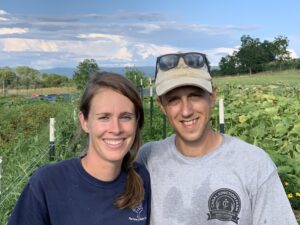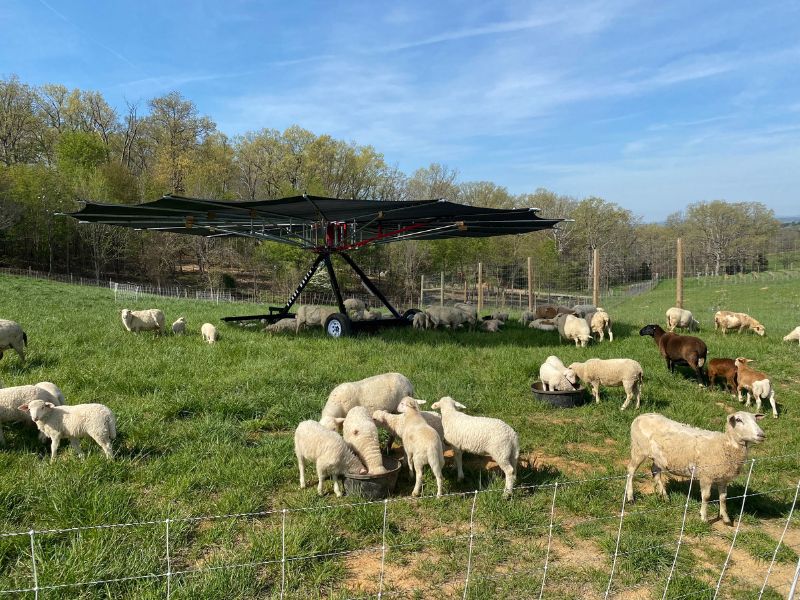First generation farmers, Adam and Allison Young purchased their Staunton, Virginia-based farm, Hayou Farm, in 2018. With minimal infrastructure in place, they started with fencing; then came the sheep. Today, 200 Katahdin sheep rotationally graze across 350 acres of pasture along with two SH1200 Shade Haven mobile shade systems.
“Our farm has a lot of pasture, and 98% of it is without trees. The Shade Haven has been a game changer. We wouldn’t be able to graze some of these fields all summer without it,” says Adam Young, who left his job as an airline pilot to farm full time in 2021.
The Youngs raise sheep in part because they are easy to handle, especially for Allison, who was the number one farmhand before Adam quit his other job. “There aren’t a lot of people raising sheep around here,” notes Young. “And we grow a lot of fruit here, too, so we can incorporate the sheep grazing around the fruit trees.”
Katahdin sheep are a hair sheep breed that originated in Maine. These hardy, low-maintenance sheep are known for their meaty carcass, though the Youngs don’t market the meat. Instead, they plan to sell breeding stock to small farms interested in raising sheep that do well on grass.
The Youngs typically run about 70 ewes, but the spring lambing season doubled their flock to just under 200. “We bred 57 this past year. Next year we will breed about 75,” says Young. “We are slowly growing.”
Grassfed and stress-free
The sheep at Hayou Farm are 100% grassfed. The Youngs use managed grazing practices, moving the sheep daily then letting that pasture rest for 30 to 40 days. The Shade Haven fits into the farm’s regenerative grazing methods, especially in areas of the pasture without ideal forage diversity – something Young hopes to improve.
“We like the mobility of the Shade Haven. If we need to focus on an area that has a lot of brambles and lack of fertility, we can put the Shade Haven there on a hot day and the sheep will congregate there,” says Young.
After just one grazing season with the Shade Havens, Young has already observed the impact on both the land and the sheep. “We can tell where we have had the Shade Haven months later. The regrowth there is good. But we really notice the impact in the health of the animals. They are putting on good weight…We are trying to get our breeding values up and meet certain weight goals, and the Shade Haven has been a valuable tool to help us do that.”
The SH1200 mobile shade system gives Young peace of mind that his flock is comfortable and healthy even on the hottest days. “Sheep are a bit more fragile than cows. You have to manage their stress load or they will get worms and have other health issues.”
“We’ve seen what happens when they get stressed out. They get hot and they are panting. They don’t gain weight or produce milk, so the babies don’t look as good,” adds Young. “The biggest benefit of the Shade Haven is being able to manage that stress in the sheep.”
 The Youngs recently purchased ten bred beef cows. As the cattle herd grows, there may be a third Shade Haven in this farm couple’s future. For now, it’s the sheep who enjoy stress-free comfort under the Shade Haven. “They love it,” says Young. “They all pack under there. On a hot day, I know where they will be.”
The Youngs recently purchased ten bred beef cows. As the cattle herd grows, there may be a third Shade Haven in this farm couple’s future. For now, it’s the sheep who enjoy stress-free comfort under the Shade Haven. “They love it,” says Young. “They all pack under there. On a hot day, I know where they will be.”
Hayou Farm offers U-Pick organically grown raspberries, blackberries and blueberries beginning in June. In the process of growing an orchard, they hope to also offer apples, pears and peaches by 2025. Find more details on this Shade Haven customer at hayoufarm.com.
